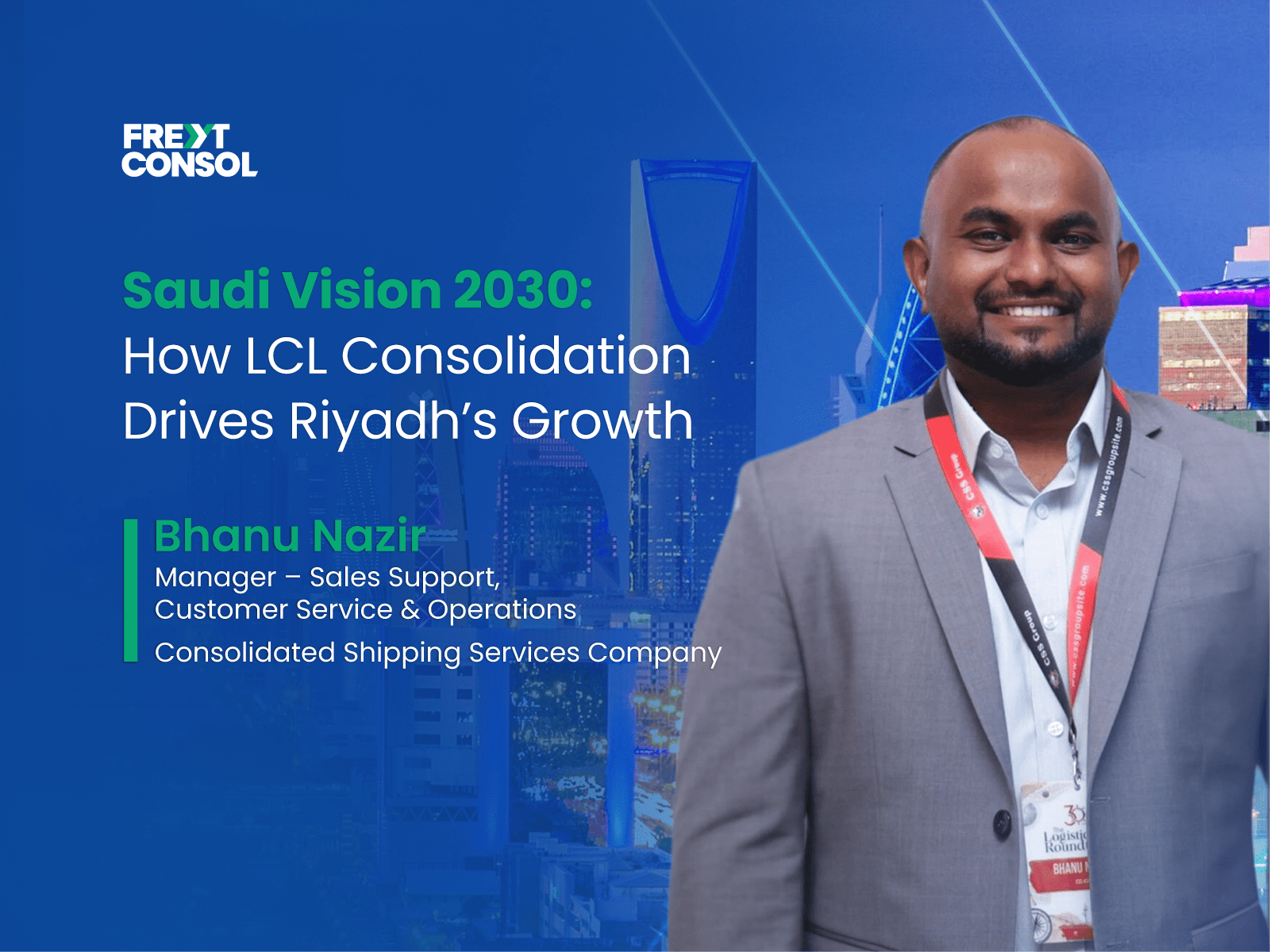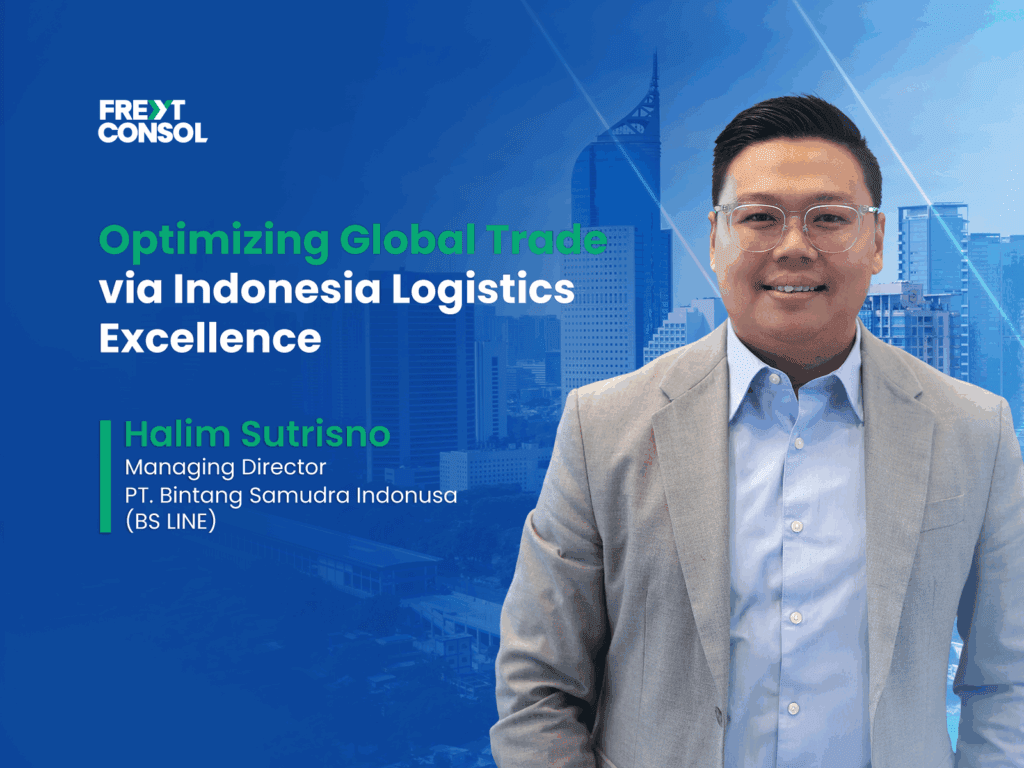By Bhanu Nazir, Manager – Sales Support, Customer Service & Operations at Consolidated Shipping Services Company (CSS)

The world is watching Saudi Arabia. The Kingdom's ambitious Saudi Vision 2030 is not just a blueprint for the future; it's a dynamic, multi-trillion-dollar transformation in progress. At its core is a monumental pledge to diversify the national economy away from its historic reliance on oil and to strategically reposition the nation as a preeminent global logistics hub connecting Asia, Europe, and Africa. For those of us on the ground witnessing this change firsthand, it’s clear that the success of this grand vision lies in the granular details, specifically, in creating a supply chain ecosystem that is as agile, innovative, and ambitious as the Vision itself.
As a proud member of the Freyt Consol network, we at Consolidated Shipping Services Company (CSS) in Riyadh see every day how smart, flexible logistics solutions are empowering this new era of commerce. At the very heart of this supply chain transformation is a service that is often overlooked but is proving to be one of the most powerful engines of economic growth: Less Than Container Load (LCL) consolidation. It is the silent workhorse enabling the very businesses that Vision 2030 is designed to foster.
The Grand Vision: Forging a Global Logistics Powerhouse
To appreciate the role of LCL, one must first grasp the scale of Saudi Arabia’s logistical ambitions. Vision 2030 isn’t merely about improving existing infrastructure; it’s about a complete reimagining of the Kingdom’s role in global trade. The National Industrial Development and Logistics Program (NIDLP) is one of the primary vehicles for this change, channeling hundreds of billions of dollars into creating world-class infrastructure.
The Kingdom is strategically investing in its maritime gateways. Major ports like Jeddah Islamic Port on the Red Sea and King Abdulaziz Port in Dammam on the Arabian Gulf are undergoing massive expansions to increase capacity and efficiency. Newer hubs like King Abdullah Port are being developed with state-of-the-art automation to handle the world’s largest container vessels. Simultaneously, the government is pouring investment into a vast network of airports, modern road systems, and groundbreaking rail projects, such as the Saudi Landbridge Project, which will create a direct freight corridor from the Gulf to the Red Sea, drastically cutting transit times.
This colossal investment is based on a clear geographical advantage. Saudi Arabia sits at the crossroads of three continents. By becoming a central hub, it aims to capture a significant share of the cargo traffic that flows between East and West. However, world-class ports and railways are only part of the equation. The ultimate goal is to create a seamless, integrated logistics ecosystem that benefits the businesses operating within the Kingdom. This is where the focus shifts from macro-infrastructure to the micro-mechanics of the supply chain, and where LCL consolidation becomes indispensable.
LCL: The Engine for a Diversified SME-Driven Economy
A central pillar of Vision 2030’s economic diversification strategy is the cultivation of a vibrant private sector, with a heavy emphasis on the growth of Small and Medium-sized Enterprises (SMEs). The government understands that these agile and innovative businesses are the true architects of the non-oil economy of tomorrow. Initiatives like Monsha'at (the General Authority for Small and Medium Enterprises) have been established to provide funding, training, and support to foster a new generation of entrepreneurs.
However, for these SMEs to succeed and compete on a global scale, they must overcome the traditional barriers to international trade, the most significant of which are often the high costs and complexities of logistics. Historically, shipping was dominated by the Full Container Load (FCL) model, which required businesses to purchase or fill an entire 20- or 40-foot container. For an SME, this model presents immense challenges: a massive upfront capital outlay, the risk of overstocking, and the cash flow strain of tying up funds in inventory sitting in a warehouse or on the ocean.
This is where LCL shipping emerges as a strategic and democratic enabler of trade. By allowing multiple shippers to share space within a single container, LCL fundamentally changes the game for SMEs.
- ∙ Financial Flexibility and Cash Flow: LCL’s pay-per-cubic-meter model allows an SME to import raw materials or export finished goods in smaller, more manageable quantities. This aligns shipping costs directly with their production cycles and preserves precious working capital. Instead of spending thousands on a full container of raw materials, a startup can order exactly what it needs for the next production run, freeing up capital for marketing, product development, and hiring.
- ∙ Reduced Risk and Market Agility: The ability to ship smaller quantities dramatically lowers the barrier to entry for international trade. An aspiring Saudi fashion brand can send a small test shipment of its designs to a boutique in Europe, or a tech startup can import a limited batch of a new component to test a prototype, all without the crippling financial commitment of an FCL shipment. This de-risks expansion and encourages the very innovation and experimentation that Vision 2030 seeks to ignite.
- ∙ Optimized Inventory and Supply Chain Efficiency: In today’s fast-moving consumer markets, speed and responsiveness are paramount. LCL provides the agility to pivot, restock, and respond to consumer demand far more quickly than waiting to fill a full container. This enables SMEs to adopt modern inventory strategies like Just-in-Time (JIT), keeping stock levels lean, reducing warehousing costs, and minimizing the risk of products becoming obsolete. By leveraging LCL, Saudi SMEs can operate with the same supply chain efficiency and nimbleness as their larger counterparts, fueling the grassroots economic growth that is the lifeblood of Vision 2030.
Riyadh: The Commercial Heartbeat of the Kingdom
While the Kingdom's ports in Dammam and Jeddah are the primary gateways for international cargo, Riyadh is its undisputed commercial, demographic, and administrative capital. As an inland hub and home to a burgeoning population and countless new businesses, connecting it seamlessly to the global supply chain is paramount. The journey from the port to a warehouse or storefront in Riyadh—the "final leg"—is a complex logistical operation that requires deep local expertise.
Efficiently moving consolidated cargo from the coastal ports to the heart of the country is not a simple task. It involves a sophisticated, multi-stage process: de-stuffing containers at the port, managing customs clearance, utilizing bonded transport to move goods inland under customs supervision, and finally, clearing the cargo at dedicated inland facilities like the Riyadh Dry Port before last-mile delivery.
This journey requires navigating a sophisticated network of roads and rails, managed with precision to ensure that cargo arrives on time and in perfect condition. For businesses in Riyadh, their logistics partner must be more than a shipping agent; they must be a master of inland distribution, capable of orchestrating this complex dance of freight, customs, and transport.
"The energy in Riyadh is palpable," says Bhanu of Consolidated Shipping Services Company (CSS). "Vision 2030 isn't just a government plan; it's a commercial reality unfolding in real-time. We see new businesses, from e-commerce startups to boutique manufacturers, emerging every week. Our role is to ensure the logistics framework is robust and agile enough to support this incredible pace of change. LCL is the key to that agility. It allows these new ventures to connect to global suppliers and customers from day one, without being suffocated by high logistics costs."
Navigating the New Landscape with an Expert Partner
The rapid evolution under Vision 2030 also brings constant changes to the regulatory and customs landscape. The Saudi government is digitizing and streamlining its trade processes to improve efficiency and transparency. While beneficial in the long run, navigating these new systems can be a significant challenge for businesses. Keeping abreast of new requirements, such as the Saber certification platform for product conformity and the national trade single-window system, Fasah, is crucial for avoiding costly delays, fines, and shipment rejections.
An experienced local partner like CSS provides more than just freight services; we provide peace of mind. We act as a crucial compliance consultant for our clients. By meticulously managing the complexities of customs clearance, ensuring all product certifications are in place, and guaranteeing full compliance with the latest regulations, we empower businesses to focus on what they do best: innovating, manufacturing, and growing.
As part of the global Freyt Consol network, we combine this critical local knowledge with international reach and best practices. This unique combination allows us to offer a seamless, end-to-end LCL solution that is both globally competitive and locally compliant. We understand the nuances of the Saudi market, from the specific documentation required at Riyadh Dry Port to the most efficient trucking routes from Dammam.
In conclusion, LCL consolidation is far more than a simple shipping method; it is a vital strategic tool powering the economic ambitions of Saudi Vision 2030. It provides the financial flexibility, operational efficiency, and market accessibility that the Kingdom’s burgeoning private sector needs to thrive on a global stage. In this era of profound transformation, we are not just moving boxes. We are building the logistical bridges that connect Saudi entrepreneurs to the world, helping to lay the very foundations of a new, diversified, and prosperous Saudi economy.

Article written by
Freyt Consol is a global network for LCL consolidators and NVOCCs dedicated to excellence and long-term growth. We create an environment where members thrive by collaborating with trusted partners and accessing essential resources.




